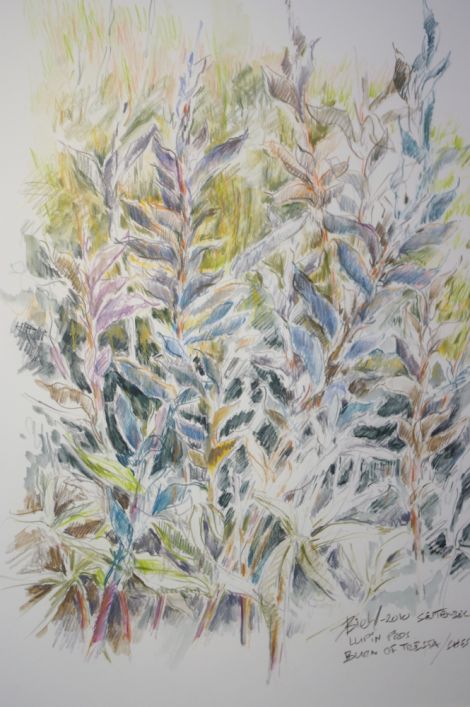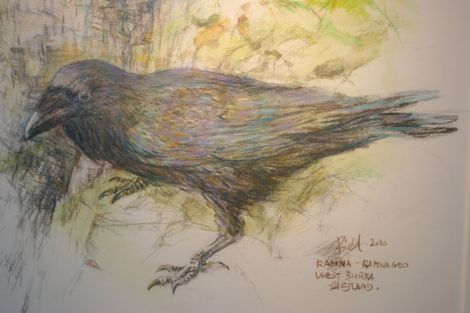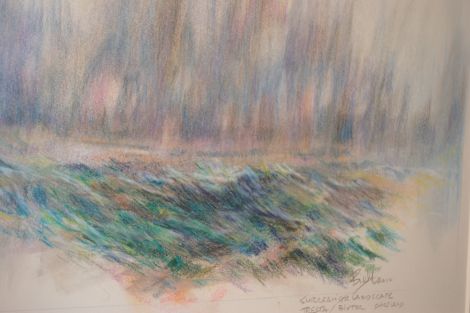Reviews / Review: A master of accuracy and individual freedom
AT FIRST glance, Peter Biehl’s animal studies look quaint; they could have come straight from the pages of a Victorian picture book but, contrary to perceived wisdom, first impressions are insignificant in this context.
He uses a combination of crayon, oil pastels, and watercolour in most of his works, the latter sometimes featuring almost incidentally to create translucency or to add patches of calm amongst the dense, intricate crayon work.
As a gardener, I felt particularly drawn to his plant portraits. All are done in situ, with his models captured in their individual wild settings. The execution of plant portraits can be a bit of a tightrope walk; they can all too easily descend into the merely decorative or, perhaps worse, whimsical romanticism.
The best capture the essence and movement of a plant or reproduce it with a great degree of botanical accuracy, while still allowing it individual freedom. Biehl is a master of both.
His Bell Heather is a great example of the latter, a cameo of late summer turf where the magenta bells are complimented by fronds of polypody fern and fungal fruiting bodies.
His treatment of exotic garden escapes in the Shetland landscape, such as Crocosmia crocosmiiflora and Mimulus aurantiacus is particularly interesting. In the former the inflorescences seem almost stylised, as he allows movement precedence over form, while in the latter he renders the incongruous orange colour even more incongruous and exotic through clever, dark, contrasting shading.
To the casual observer the seedpods of Lupinus nootkatensis are a uniform, mouse fur grey, but Biehl, in his composition Lupins at Tresta Burn, has perfectly captured the play of light and shade and turned the twisting seed pods into flickering blue and mauve flames.
If I had to choose just one, it would have to be Cotton Grass, where the white tassels are captured on a blustery day, and the rippling wind runs through the composition in a rhythmic, repeating pattern.
Become a member of Shetland News
While the flora resides in the third room at Vaila Fine Arts, in the second fauna rules supreme. It’s in Biehl’s animal portraits that his superb draughtsmanship and formidable anatomical knowledge really come to the fore.
Dramatic cliff scenery and a variety of seabirds in soaring flight dominate one wall, but one bird appears again and again.
Biehl seems to have a special affinity with ravens, individuals, rather than the genus as such; and Ramna the raven in particular. His studies of this bird and her family are the most intimate amongst his avian portraits.
The detail – from the rainbow iridescence of the black feathers, the position and curve of each individual claw, to the look of concentration in the bird’s eye as it is about to land – is impressive, and bears witness to his long, intensive study of his subjects.
Two close-ups of sitting eider ducks – one since on its way to Austria – have a tactile softness: the viewer all but feels the warm silkiness of the birds’ plumage, as they sit, flat-backed, head drawn in, attempting invisibility as they blend in with their surroundings.
His mammal portraits have the same tactile quality, from the vulnerability of a pony’s lips to the magnificent fleeces and regal bearing of ewes watching over their plump twin lambs.
Here again, the attention to detail is striking, with one of the mothers still sporting a chest adorned with pre-partum sphagnum moss.
With one exception all the pictures in this exhibition are based on the natural world and, at first glance, the exception seems to be drawn from the natural world also. What looks like a highly polychromatic rendition of the northern lights carries the title Surrealistic Landscape, a view of a stormy sea and foggy horizon painted from Biehl’s window at the head of Tresta Voe.
He told me this painting is based on the long tradition of ghost ships and sailors’ mirages, and if you look carefully you can discern the outlines of a splendid galleon in full sail through the curtains of sea mist.
Peter Biehl grew up in Denmark, trained at the Academy of Fine Art in Copenhagen, and worked as an art teacher until his retirement in 2006. He fell in love with the Shetland Islands during a first visit in the 1990’s and has been resident in Tresta, on the Westside for five years.
His exhibition May to October can be seen at Vaila Fine Arts until the end of July.
Rosa Steppanova
Become a member of Shetland News
Shetland News is asking its many readers to consider paying for membership to get additional features and services: -
- Remove non-local ads;
- Bookmark posts to read later;
- Exclusive curated weekly newsletter;
- Hide membership messages;
- Comments open for discussion.
If you appreciate what we do and feel strongly about impartial local journalism, then please become a member of Shetland News by either making a single payment, or setting up a monthly, quarterly or yearly subscription.






























































